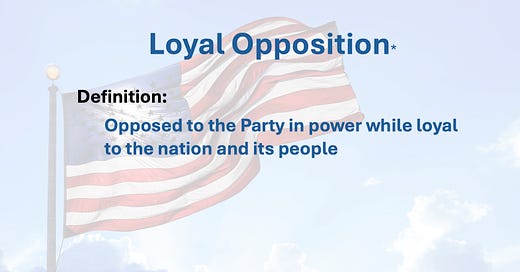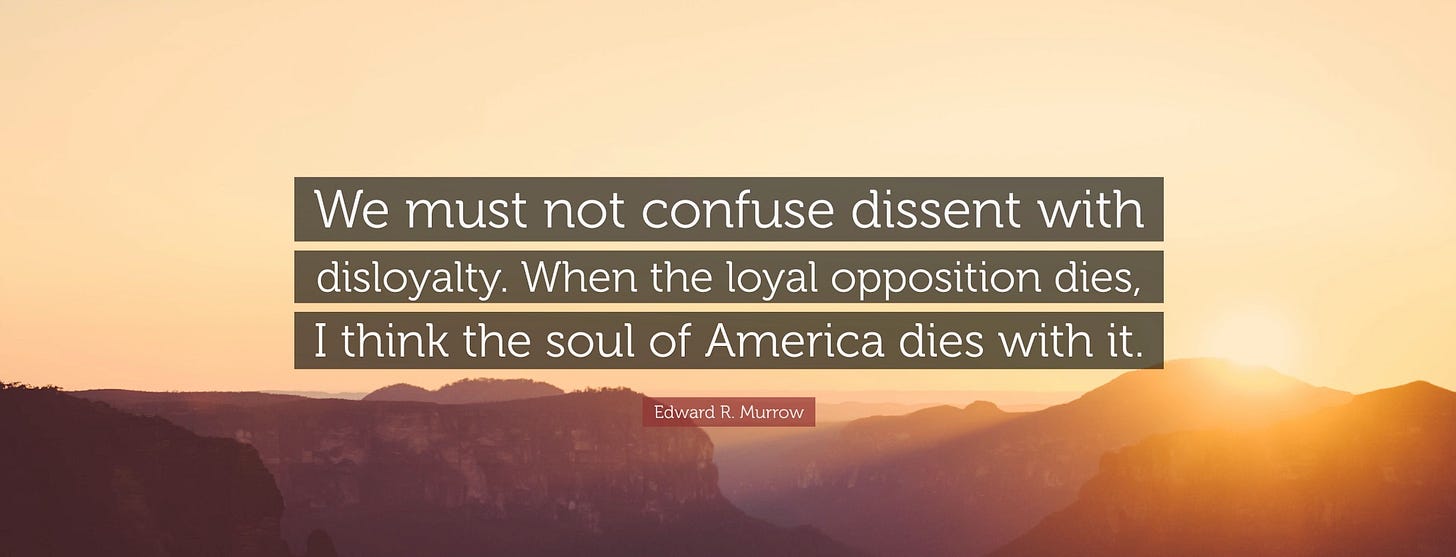Beyond Resistance—The Case for the Loyal Opposition
In recent years, the political discourse in America has seen a surge in the language of resistance, particularly in response to the hatred, cruelty, and divisive policies, programs, and rhetoric associated with the MAGA Republican movement. In this context, resistance has played a vital role in mobilizing people against policies that threaten democracy, justice, and the social fabric. However, resistance alone is not enough to secure lasting change. If an opposition movement is to succeed, it must go beyond saying "no" to what it opposes. It must articulate what it stands for, define its goals, and work actively toward a positive vision for the future.
This is why I advocate embracing the perspective of loyal opposition. Rather than simply reacting to policies we find abhorrent, let us build a movement that works proactively for meaningful change. Let us identify the values, policies, and outcomes we seek to achieve and organize around those principles. By focusing on becoming the loyal opposition, we can transform ourselves from a blocking force into a creative, constructive power that advances the common good.
The following discussion explores why the loyal opposition offers a more effective and enduring path forward, drawing comparisons with the limitations of resistance and highlighting the lessons we can learn from systems where the loyal opposition is institutionalized. It argues that while resisting harmful policies is necessary, actual progress requires a movement defined by what it is for, not just what it is against.
The Loyal Opposition: A Visionary Force for Progress
In a society polarized by competing ideologies, the distinction between loyal opposition and resistance offers a profound insight into the dynamics of political and social change. While both positions reject certain policies or actions of those in power, their underlying philosophies, strategies, and outcomes differ markedly. The loyal opposition, grounded in constructive engagement and a clear vision for the future, wields far greater potential to effect meaningful change than the reactive stance of the resistance. To truly make our communities and nation better for all, it is imperative to embrace the ethos of the loyal opposition—a philosophy of purpose, accountability, and collaboration.
Resistance: A Reactive Impulse
Resistance is often romanticized, invoking images of defiance and moral courage. However, resistance is inherently reactive. It defines itself in opposition to an external force, often focusing on obstruction rather than creation. By positioning itself merely as a barrier, the resistance risks surrendering its power for good to the narrow objective of thwarting perceived harm.
While resistance may successfully mobilize people around shared grievances, it frequently lacks a cohesive vision of its goals. Without articulating positive policies or constructive solutions, resistance movements risk becoming transient phenomena. They may temporarily impede harmful actions, but they often fail to lay the groundwork for long-term progress, leaving a vacuum that can perpetuate the very problems they oppose.
The Loyal Opposition: A Visionary Alternative
In contrast, the loyal opposition is not merely a critic of those in power but a partner in pursuing a better future. Rooted in principles of democracy and mutual respect, it seeks to hold power accountable while offering alternative paths forward. Its effectiveness lies in its dual commitment: opposing policies it deems harmful and advancing constructive proposals that align with its vision for the common good.
The term "loyal" is vital. In this context, loyalty does not mean allegiance to a particular leader or party but to the overarching principles of democracy, justice, and the well-being of all. The loyal opposition understands that the ultimate goal is not to "win" against an opponent but to create policies and systems that benefit the broader community. This perspective fosters dialogue, negotiation, and compromise—hallmarks of a healthy democracy.
Lessons from the United Kingdom: A Formal Structure
While the idea of resistance may be more culturally ingrained in the United States, the United Kingdom offers a contrasting model that highlights the strengths of the loyal opposition. In the UK, the loyal opposition is not just a concept but a formalized institution. The official opposition party is recognized as an essential component of the democratic system, with its leaders forming a shadow cabinet that mirrors the government’s structure. This shadow cabinet allows the opposition to present clear alternatives, scrutinize government policies, and demonstrate how it would govern if given the opportunity.
The shadow cabinet embodies the loyal opposition's proactive ethos. It does not merely oppose the majority's policies but puts forward bold, detailed plans of its own. This approach forces the majority to engage with substantive critiques and proposals, elevating the quality of political debate. Furthermore, the formal structure encourages opposition parties to identify areas of potential compromise, seeking "targets of opportunity" where collaboration with the majority might advance their policy objectives. This strategic pragmatism exemplifies the loyal opposition’s commitment to progress rather than mere obstruction.
Blocking as a Necessary but Secondary Role
There are times when the loyal opposition must act as a blocking force, particularly when majority policies threaten fundamental rights, democracy, or long-term stability. In such moments, opposition leaders have a duty to stand firm and mobilize resistance to prevent harm. However, this should not be the sole focus of their efforts. Concentrating entirely on blocking risks becoming a force of negativity, defined only by what it opposes rather than what it supports.
Instead, the loyal opposition must balance its defensive role with its proactive mission. Even as it works to block harmful policies, it should remain focused on advancing its agenda and presenting its vision for the future. This dual approach ensures that the opposition remains a constructive force capable of shaping the political landscape rather than merely reacting to it.
The Power of Working Toward Something
The loyal opposition's strength lies in its clarity of purpose. Knowing what one is working for—not just what one is against—is to possess a moral compass and a roadmap for action. This positive orientation inspires hope and mobilizes people around shared ideals rather than shared frustrations. It also invites collaboration, even with those who may hold opposing views, creating opportunities for unexpected alliances and innovative solutions.
For example, a loyal opposition to environmental deregulation might critique the rollback of protections and propose comprehensive plans for renewable energy, sustainable agriculture, and green job creation. By presenting a clear alternative, the loyal opposition shifts the focus from resistance to progress, making it more likely to achieve tangible results.
Reclaiming the Power for Good
In a deeply divided world, it is easy to define oneself by opposition to "the other." However, this approach limits one's power to obstruction, leaving the field of creation and progress to others. The loyal opposition reclaims that power, channeling it into pursuing a positive vision for the future. This approach does not ignore the need to resist injustice or harm but integrates it into a broader strategy of constructive action.
The choice between being the loyal opposition and the resistance is ultimately a choice between building and tearing down, between vision and reaction, and between hope and grievance. By embracing the principles of the loyal opposition and learning from the formal structures of systems like the UK’s shadow cabinet, we affirm our commitment to a better future—not just for those who agree with us but for everyone. This is the true power of working toward something: it transforms opposition into opportunity, creating communities and a nation where all can thrive.
I pledge to always work for the common good, recognize the worth of every individual, and accord them the respect and dignity each deserves.







Thank you. I do feel it is an important message. We all need to spend more time discussing and working for what we advocate and stand for. Simply being a blocking force is demoralizing.
Wonderful! We’re sharing this with our Facebook group to spread the seeds of this message to trusted others.